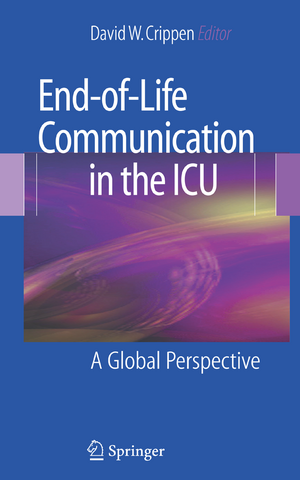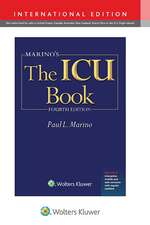End-of-Life Communication in the ICU: A Global Perspective
Editat de David W. Crippenen Limba Engleză Hardback – 29 noi 2007
| Toate formatele și edițiile | Preț | Express |
|---|---|---|
| Paperback (1) | 767.27 lei 6-8 săpt. | |
| Springer – 28 oct 2010 | 767.27 lei 6-8 săpt. | |
| Hardback (1) | 715.55 lei 6-8 săpt. | |
| Springer – 29 noi 2007 | 715.55 lei 6-8 săpt. |
Preț: 715.55 lei
Preț vechi: 753.22 lei
-5% Nou
Puncte Express: 1073
Preț estimativ în valută:
136.96€ • 142.44$ • 114.77£
136.96€ • 142.44$ • 114.77£
Carte tipărită la comandă
Livrare economică 13-27 martie
Preluare comenzi: 021 569.72.76
Specificații
ISBN-13: 9780387729657
ISBN-10: 0387729658
Pagini: 178
Ilustrații: XX, 180 p. 10 illus.
Dimensiuni: 155 x 235 x 15 mm
Greutate: 0.41 kg
Ediția:2008
Editura: Springer
Colecția Springer
Locul publicării:New York, NY, United States
ISBN-10: 0387729658
Pagini: 178
Ilustrații: XX, 180 p. 10 illus.
Dimensiuni: 155 x 235 x 15 mm
Greutate: 0.41 kg
Ediția:2008
Editura: Springer
Colecția Springer
Locul publicării:New York, NY, United States
Public țintă
Professional/practitionerDescriere
Talking to patients and their families about end-of-life issues can be difficult and stressful. End of Life Communication in the ICU looks at ways different cultures view death and then further explores how health care providers around the world communicate about such sensitive issues as withholding or withdrawing life support and discussing options when the outcome is uncertain. Through a better understanding of cultural differences in attitudes about death and methods of communications about end-of-life issues, practitioners can be better prepared to communicate with their own patients and their patients’ families.
Cuprins
Multinational perspective on end of life issues in the ICU.- Critical illness and end of life issues: a global view.- Death in a lonely place: pathophysiology of the dying patient.- History of the definitions of death: 18th to 20th century.- What it feels like to live and die on life support.- Who is in charge of the ICU?.- Communicating with the difficult family.- Emotions in the ICU.- Role of the ethics committee in end of life care.- Medical liability issues.- End of life issues vs. politics.- Comments from ancillary healthcare providers.- ICU of the future
Recenzii
From the reviews:
"This is multiauthored collection of perspectives on medical futility, its communication, and its management in the critical care setting. … Senior staff, fellows, and residents at all levels are an appropriate audience for this work which originates from a multinational set of authors with an interest in end-of-life care." (David J. Dries, Doody's Review Service, February, 2008)
"The book chronicles a wide range of views from practitioners, ethicists, historians, scientists, health care administrators, and consumers from around the world and examines how these interactions affect global health care delivery. The book is loosely organized into brief chapters that capture multinational perspectives on end-of-life care, resource management in critical care, and ethics. … offers the reader a cultural tour of end-of-life communication practices through the eyes of frontline practitioners." (Elaine C. Meyer, JAMA, October, 2008)
"This is multiauthored collection of perspectives on medical futility, its communication, and its management in the critical care setting. … Senior staff, fellows, and residents at all levels are an appropriate audience for this work which originates from a multinational set of authors with an interest in end-of-life care." (David J. Dries, Doody's Review Service, February, 2008)
"The book chronicles a wide range of views from practitioners, ethicists, historians, scientists, health care administrators, and consumers from around the world and examines how these interactions affect global health care delivery. The book is loosely organized into brief chapters that capture multinational perspectives on end-of-life care, resource management in critical care, and ethics. … offers the reader a cultural tour of end-of-life communication practices through the eyes of frontline practitioners." (Elaine C. Meyer, JAMA, October, 2008)
Textul de pe ultima copertă
Advances in technology have led to a global network of physicians in which information, data, and practices can be openly shared to help ensure high-quality care. End-of-Life Communication in the ICU is a manifestation of this belief that a multiplicity of perspectives can assist in the decision-making process. The book, with contributions from a diverse group of leaders in the international ICU community, examines how different cultures view death and explores how healthcare providers around the world communicate to patients and family members such sensitive issues as withholding or withdrawing life support and discussing options when the outcome is uncertain. Intensivists and other members of the intensive care unit will benefit greatly from this thoughtful dialogue about the emotional, ethical, and legal complexities of making end-of-life decisions.
Caracteristici
A guide to communicating with ICU patients and their families about end-of-life issues, with emphasis on global differences in attitudes toward death and the common goal of the most effective, comprehensible communication possible












